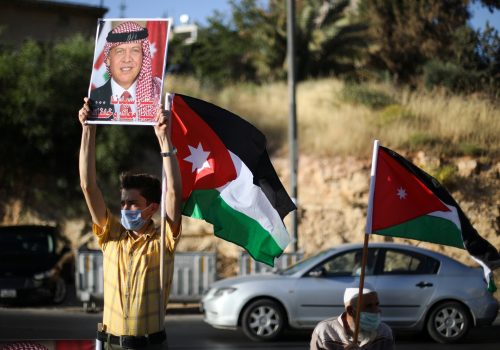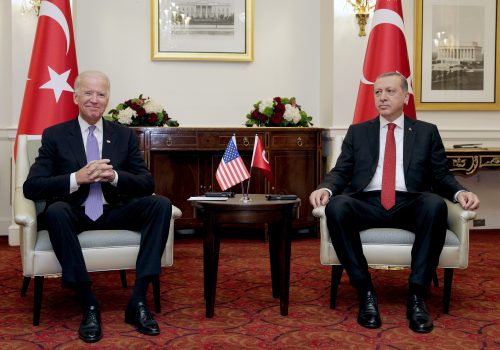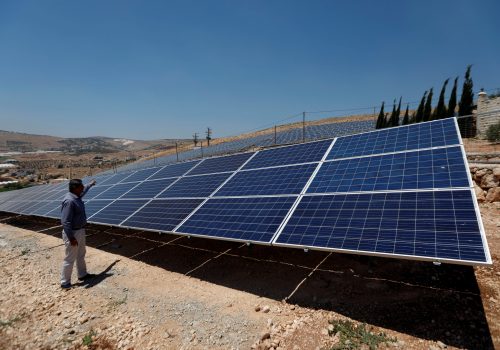As Israel and Jordan face an environmental squeeze, they must rebuild trust
Some members of the international community are boosting their commitments to combating climate change and reducing fossil fuel emissions. But Israel and Jordan are still waiting on a vital precondition—political goodwill—in order to expand their existing cooperation on environmental issues and other energy-related projects.
Since signing a peace treaty in 1994, the two Middle Eastern neighbors have enjoyed several decades of economic and security cooperation. But today, the Israel-Jordan relationship is in dire straits. This is due to the stagnant Israeli-Palestinian peace process, which has hamstrung Jordan’s ability to publicly cooperate—or “normalize”—with Israel, as well as the Donald Trump administration’s 2017 decision to recognize Jerusalem as Israel’s capital and the Benjamin Netanyahu government’s perceived efforts to undermine the Hashemite royal family’s traditional role as custodian of holy sites in Jerusalem’s Old City. Since 2014, a series of incidents have plagued bilateral ties, including violent episodes involving Israeli security personnel and the cancelation of lease agreements to Israeli farmers. In October 2019, the twenty-fifth anniversary of the peace treaty passed without celebration.
Even strategic achievements between the two countries—such as signing a natural gas agreement in 2014 or establishing a commercial corridor through Israel that links Jordan to the Eastern Mediterranean and Europe—are overshadowed by dark clouds hovering over bilateral relations.
The personal discord between Jordanian King Abdullah II and then Israeli Prime Minister Netanyahu reached its nadir during the summer of 2020, when Israel weighed the partial annexation of territories in the West Bank, prompting Jordanian warnings that unilateral action would undermine the prospects of peace in the region. Israel eventually changed course, although that was largely driven by the opportunity to reach a historic agreement with the United Arab Emirates, Bahrain, Sudan, and Morocco in the Abraham Accords. Jordanian concerns appeared secondary for Netanyahu. Meanwhile, King Abdullah’s unwillingness to sidestep the Israeli-Palestinian issue for the sake of a regional grand bargain made him an obstacle in the eyes of the Trump administration, setting in motion a series of events that threatened the monarchy’s stability.
As bilateral relations have suffered, so too have prospective infrastructure projects. The Red Sea-Dead Sea Water Conveyance project—designed to increase Jordan’s limited water supply, address the rapid shrinking of the Dead Sea, and facilitate greater cooperation between Israel, Jordan, and the Palestinian Authority—dismissed by Jordan and the World Bank in June 2021. Days after the World Bank’s announcement, it was announced that Jordan would invest in its own Red Sea desalination plant without Israeli cooperation.
The deterioration of bilateral relations does not serve either party’s long-term interests. Israel and Jordan are codependent and contribute to another’s stability. As regional temperatures increase and resources become increasingly scarce, the imperative for cooperation in the fields of energy, water, and sustainability are greater than ever before. Therefore, it comes as little surprise that current efforts to rehabilitate bilateral relations are focusing on cooperation in these areas.
Under the leadership of Prime Minister Naftali Bennett and Foreign Minister Yair Lapid, Israel’s new government has prioritized resetting ties with King Abdullah. In early July, it was reported that—following a secret meeting between Bennett and King Abdullah—Israel agreed to sell Jordan 50 million cubic meters of water, the largest such transaction since the signing of the peace treaty. Days later, Israel’s Foreign Ministry announced that Lapid had also met with his counterpart, Ayman Safadi, and reached a number of agreements regarding the expansion of Jordanian exports to the West Bank and other areas of cooperation.
But restoring trust between Amman and Jerusalem is also an American priority, as demonstrated by the Joe Biden administration’s decision to invite both Jordanian and Israeli leaders to Washington. In the readout of President Biden’s meeting with King Abdullah on July 19, the White House applauded the recent water deal between the two countries and pointed towards future American support for “greater regional economic integration through investments in energy infrastructure.”
Indeed, Israel and Jordan are uniquely positioned to cooperate on future renewable energy projects. Nicknamed the Startup Nation, Israel is increasingly a green technology hub as well. But many of those innovations haven’t been put to use domestically. In 2020, only 5.8 percent of Israel’s national energy output came from renewables, mostly solar power. While the Energy Ministry has committed to raising renewables to 30 percent of the national output by 2030, land shortages, limited storage technology, and regulatory hurdles pose stiff challenges to this goal. In order to overcome the lack of available land to construct solar fields, the Energy Ministry released a “roadmap for a low-carbon energy economy by 2050” that proposes a range of programs designed to meet emissions targets, including plans to connect Israel’s electricity grid with Europe, Egypt, and Jordan. Such cross-border infrastructure projects would establish bilateral and multilateral interdependencies, collectively increasing regional energy security and stoking the transition from fossil fuels to renewables.
In contrast to Israel, Jordan possesses vast, sparsely inhabited desert spaces ideal for solar energy production—has similar renewable aspirations. By 2030, the desert kingdom plans to increase its solar energy output from 20 percent to 30 percent and has already attracted international investment.
As Israeli energy and Jordanian water demands are expected to increase in the coming years, original solutions are rising to the surface. EcoPeace Middle East, an environmentalist organization with offices in Jordan, Palestine, and Israel, initiated the Water & Energy Nexus project. In the proposed project outline, Jordan would expand its solar energy capacity to supply Israel and the Palestinian Authority with electricity in exchange for the reliable supply of desalinated water from Israel. According to EcoPeace Middle East, each of the three parties stand to benefit: Jordan would cost-efficiently attain water security and become a major energy exporter; the Palestinian Authority would reduce its dependency on Israel for energy (a thorny political subject) and buoy its own water scarcity issues, while also integrating into regional processes; and Israel would achieve its renewable energy goals, further develop its desalination sector, and preserve its limited land for other purposes. Most importantly, the project would provide a blueprint for future cooperation between the three neighbors.
Even if the Water-Energy Nexus project does not come to fruition, its core message should not be ignored. Just as Israel and Jordan share a common future, the same can also be said about the Palestinian Authority. And in order to turn a corner in its relationship with Jordan, Israel must find a way to cooperatively engage with the Palestinian Authority—which also struggles with its dependence on external sources for energy and water—and include it in regional processes, especially those related to energy, water security, and sustainability.
International actors committed to the stability of the relationship should encourage investments that support regional cooperation and sustainability. This list includes the United Kingdom, which seeks a role in regional affairs and enjoys positive relations with both parties. Through its Southern Neighbourhood policy, the European Union (EU) could also contribute to green-energy initiatives that contribute to regional stability. And, ideally, there is a role for Gulf countries to play as well. However, as illustrated during the Biden-Abdullah summit this week, American leadership is an essential factor to future relations between Amman and Jerusalem.
Collectively addressing the destabilizing consequences of climate change should be a pillar of Israel-Jordan relations, and both sides should be applauded for their initial efforts to reset ties in the post-Netanyahu era. But rebuilding trust won’t happen overnight, and much depends on Israel’s willingness to cooperate with the Palestinian Authority. Still, there is reason to be hopeful that with the right combination of incentives both countries can reverse the trends of a troubled decade and set a course that tackles the biggest threat to regional stability and human security. Effective partnership in resource management would not only improve the next generation’s access to affordable energy, water, and electricity, but would also reduce the risk of future violence and establish a model for regional cooperation.
Gabriel Mitchell is the director of external relations at Mitvim—The Israeli Institute for Regional Foreign Policies and a doctoral candidate at Virginia Tech University. Follow him on Twitter at @GabiAMitchell.
Image: Diggers work at a polluted area caused by an oil spill at the Evrona desert reserve, near the Red Sea resort city of Eilat December 10, 2014. Ecologists said on Wednesday it could take years to clean up the massive oil spill that flooded an Israeli nature reserve with up to five million litres of crude and threatened to spread to the Red Sea shore and neighbouring Jordan. REUTERS/Baz Ratner


